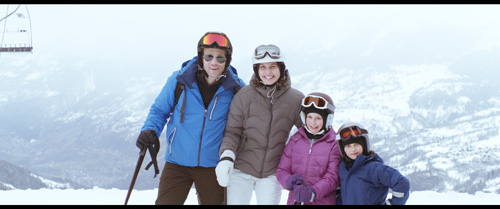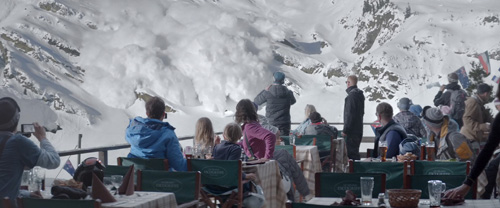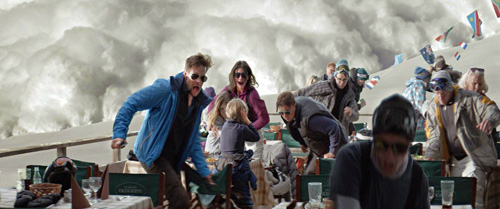
Your complimentary articles
You’ve read one of your four complimentary articles for this month.
You can read four articles free per month. To have complete access to the thousands of philosophy articles on this site, please
Films
Force Majeure
Thomas Wartenberg asks if you really know yourself.
Do you know what you’d do if you suddenly found yourself facing imminent death, say from a rapidly approaching tornado or avalanche? Would your normal sense of yourself as (I assume) a well-meaning, moral adult get you through the cataclysmic situation with that sense of self left intact? Or would your own fear, perhaps even panic, undermine your ability to act in ways you would be proud of? These are some of the questions posed by Force Majeure, a 2014 Swedish social comedy directed by Ruben Östlund.
The film takes place at a ski resort in the French Alps, where a young, well-off Swedish family has come for a week’s vacation. Early on, Ebba Kuhnke, the wife, tells a fellow guest that they have come because her husband Tomas has been working so much that he has neglected his family. This is a week for him to reconnect to his wife and young children Vera and Harry. Things start off well, as we see the family having their pictures taken against the background of the beautiful mountains where they will soon be skiing.
But on the second day of their vacation a bizarre event casts a deep pall over the family. Having lunch on the terrace of the resort, they become aware of the sound of blasting. The source of these explosions are cannons spaced around the mountains used to cause controlled avalanches, thereby making the ski slopes safe. Ebba and the children become alarmed, but Tomas tells them not to worry, for the people in charge, he reassures them “know what they’re doing.” The avalanches are controlled, he explains, so there’s nothing to be worried about. However, things soon take a turn for the worse, as it appears as if the avalanche is indeed going to hit the terrace. As snow overtakes the diners, we see Ebba trying to shelter her children while Tomas flees, apparently eager only to save his own skin. After a long period in which the screen is completely white – indicating, we viewers take it, that snow has buried everyone on the terrace – the white mist dissolves, and the diners are able to return to their tables. It was only ‘avalanche smoke’, Ebba later explains. Ebba and the children sit down to eat, although one of them asks, “Where’s Dad?” Soon Tomas returns and sits down as if nothing unusual has transpired. After all, as he says, they are all safe, so nothing is amiss.

Happy family on arrival day
Stills from Force Majeure © Beofilm/Triart Film 2014
But, of course, something is amiss. The head of the family deserted the three people he is supposed to take care of just at the very moment they most need his protection, presumably because fear so shook his being. The film is poised to embark on a critique of masculinity or, at least, of the way in which this man in particular failed to live up to its ideal.
Later, when they are alone, Ebba and Tomas have trouble talking about what has happened being able only to reassure each other that the family has come through the event unharmed. However, when they are having dinner with other guests at the resort, Ebba explains that Tomas deserted her and their children during what appeared to be a deadly avalanche. Suddenly, a friendly social event has descended into a scene from Who’s Afraid of Virginia Woolf? or Scenes from a Marriage. Tomas denies that he ran from his family – a denial that causes Ebba to reassert her memory of the traumatic event. She adds that she would never do something like that; that keeping her kids safe is the most important thing to her, so she would never act as Tomas did. There is a real difference between how a man acts and how a woman does, she asserts – fueling the film’s developing critique of contemporary masculinity. They bicker back and forth, each asserting that the other’s view is simply wrong. Eventually, having returned to their hotel room after that tense dinner, they hug as Tomas tries to convince Ebba that it’s fine for them to have two different versions of the day’s events. Their differences are just that, and should be accepted, he maintains, despite the fact that he has refused to say more about how he remembers the event.

Here it comes…
After a tense third day on the slopes, the family hosts Mats, an old friend of Tomas, and Fanni, his much younger girlfriend, for dinner. The scene is filmed in an unusual manner: the camera sits behind Ebba’s empty chair, whilst Ebba is walking around serving everyone and describing how wonderful the vacation has been. As if to give us a visual cue that she is not really expressing her true beliefs, the shot continually cuts off Ebba’s head, as if she were just a body going through the motions of entertaining her guests and feeding her family. When she finally sits down at the table, her presence more or less blocks our view of the entire scene, calling our attention to her efforts to obscure what she is feeling.
During an after-dinner conversation that takes place when the kids have gone to bed, Ebba suddenly interrupts Fanni in the midst of a story she is telling and blurts out that Tomas deserted his family during the avalanche. Taken aback by the implications this has for Tomas and Ebba’s marriage, Mats tries to defend the silent Tomas, saying that no one really knows what they would do in a situation like that, so it’s wrong to blame Tomas for what he did. It’s not as if he reflected on the situation and decided to desert Ebba and his children; his flight was just a gut reaction to his fear. Throughout Mats’ defense of him, even under direct questioning, Tomas remains silent. Even when Ebba gets Tomas’s iPhone and shows the recording he made of the event in which his own flight is recorded, Tomas only grudgingly concedes that it appears that someone is running. Because Mats is Tomas’s friend, we don’t take Mats’ claims at face value, but instead as simply finding a way to rationalize Tomas’s behavior, creating the defense Tomas is incapable of mounting. Mats even suggests that Tomas was really running away because he knew that it is hard to dig oneself out of an avalanche, so that he was doing what he needed to in order to save his family members once the avalanche had subsided. Sure, we knowingly nod to ourselves in disagreement.
Eventually, after a day skiing with Mats, Tomas returns to find himself locked out of the apartment. After a number of hours, Ebba finally notices him in the hallway and lets him in. But the stress has been too much and Tomas breaks down in hysterical tears. Admitting that he ran, he says that Ebba isn’t the only one who has been let down, for he has let himself down. And out come a number of other confessions: to affairs for which he too easily apologizes, and to cheating at games with his own children, among other transgressions. We suddenly realize that there was a deeper reason for this vacation than the one Ebba originally expressed: they are attempting to save their marriage in the face of Tomas’s infidelity.

Panic Stations!
Signs of Life
Perhaps the most humorous scenes take place between Mats and Fanni after they have left the apartment. As they stand waiting for the elevator, Fanni asks Mats if he would save her in a similar situation. His momentary hesitation results in her expressing her doubts that he would, since men of his generation, despite being more caring than the men of the previous generation, lack the emotional commitment that men of her generation have. Fanni takes Tomas’s failure to indicate the deficiencies of men in their thirties, who represent a different generation to her. Her critique is that men of that generation have not fully accepted the need to value their children and partners the way that men of her generation have. When Mats protests that he has done everything for his children, Fanni counters by asking him where they are now. She supplies the devastating answer: with his divorced wife.
On the family’s final day of skiing, in a rather bizarre sequence, the family achieves reconciliation, suggesting that Tomas’s acknowledgment of his own wrongdoing was sufficient to salvage the marriage. Taking the kids up the mountain on a foggy day when there is almost no vision, Tomas assumes the masculine role of guide, skiing down the mountain before the two kids, with Ebba taking up the rear. Soon, Ebba is nowhere to be found. Tomas leaves the kids and returns carrying Ebba in his arms. When they rejoin their children, Ebba assure the kids that all is now well, and they head off down the mountain, a family once again.
The film’s penultimate scene continues its portrayal of Tomas’s and Ebba’s reconciliation by showing that Ebba’s confidence that she would always put her children first is misguided. Their vacation over, the family descends the extremely steep and windy road to the resort in a bus. Earlier, we had seen Mats and Fanni taking the bus up the mountain. All of them are now on the return trip. The bus driver appears to be a maniac: he drives way too fast only to brake sharply to avoid crashing into the retaining wall and plunging into the ravine. Ebba becomes panic-stricken, sure that an accident is imminent. She demands to be let off the bus and when the driver opens the door she bolts, leaving her kids for Tomas to deal with. Ebba has reacted to the threat posed by this maniacal bus driver in precisely the same way that Tomas did to the avalanche: by running for her life. Force Majeure thus suggests that we all lack knowledge about how we will react in extreme situations. Ebba is wrong about herself, so that her condemnation of Tomas is ill-founded too. As her own actions prove, when the relevant fear is activated, she too abandons her own children.
One of the virtues of Force Majeure is that it poses questions about relationships in a way that does justice to some of the complexity of our moral lives. Ebba can be right that Tomas has behaved badly, even if she is wrong to deny the possibility of acting badly in a stressful situation herself. All of us succumb to both fears and temptations in ways that conflict with our moral ideals, but that’s simply part of our condition as human beings. Force Majeure deserves credit for finding an innovative way of presenting this perspective to viewers.
© Prof. Thomas E. Wartenberg 2015
Thomas Wartenberg is the author of Thinking on Screen (Routledge). He teaches philosophy and film studies at Mount Holyoke College in Massachusetts.









